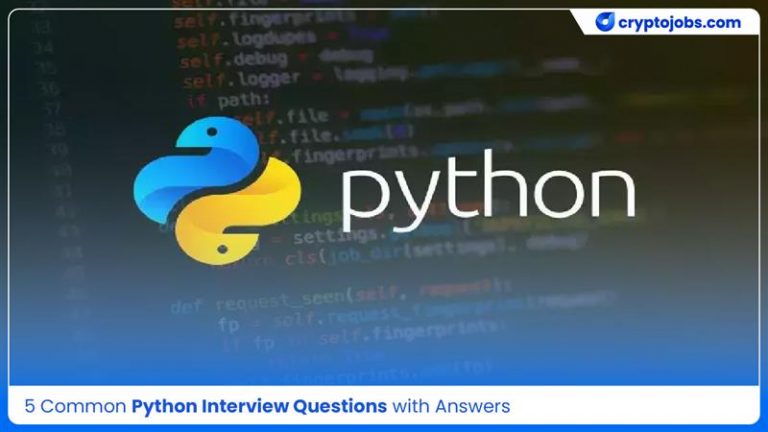
5 Common Python Interview Questions with Answers
- cryptojobs.com
- February 14, 2025
- All Posts, Career Guide, Interview Questions
- Web3
- 0 Comments
As the web3 companies continue to grow, the demand for Python programmers is increasing. Python is a general-purpose, high-level programming language known for its readability and simplicity. This versatile language is easy to learn, which adds to its utility, and expertise in this programming language is a highly sought-after skill. If you are a developer, engineer, or programmer with command over Python, this is the right time for you to search for your dream job in the web3 industry.
As long as you have command over programming with Python and ace your interview, finding your dream job will come easy. To help you out, here are the five most common Python interview questions with their answers so that you can be fully prepared to impress the hiring managers.
Let’s take a look!
Are you a talented professional looking to find your dream Python job in the web3 industry? Look no further; register with cryptojobs.com today to find the most sought-after opportunities.
What is Python? List Some Popular Applications of Python in The World of Technology.
This is one of the most basic questions and has a high probability of being included in your interview. Here is how you can answer each of these parts:
Python is a high-level programming language widely used for multiple purposes. It was created by Guido van Rossum in 1991 and further developed by the Python Software Foundation. It emphasizes code readability, with its syntax allowing programmers to showcase their concepts in fewer lines of code. Python is mostly used as part of the following:
- System Scripting
- Software Development
- Game Development
- Web Development
- Complex Mathematics
A similar job that you might be interested in is Python Developer. You can apply here: https://www.cryptojobs.com/job/python-developer-6054
How is Exceptional Handling Done in Python?
In this question, the interviewer is trying to assess if you understand the concept of Python beyond the usual Google definition. Here is how you can answer this one:
This concept has three keywords: try, except, and finally. These keywords are used to catch exceptions and handle recovery mechanisms. The try block is a code used to monitor faults and bugs. The except block is usually executed whenever a fault occurs. The most essential block, finally, executes the code after encountering an error. It is executed regardless of whether a fault has occurred. Finally, it is used to clean up activities involving variables and objects.
Differentiate Between For Loop and While Loop in Python.
In this question, the interviewer wants to know if you are aware of terms that are associated with Python. Consider answering it in this way:
The ‘for’ loop is mostly used for iterating through the fundamentals of different collection types, such as Tuple, Dictionary, Set, or List. Developers use the ‘for’ loop mainly in instances where both the start and end conditions are present.
In contrast, the ‘while’ loop comes into play when other programming languages are being used, typically as their actual looping feature. When programmers only have the end conditions, they opt for the while loop instead of for.
Can We Pass a Function as an Argument in Python?
This is where things can begin to get tricky. This question signifies, to some extent, that the interviewer is impressed with how you have answered questions previously. Here is how to go about this particular question:
Yes, multiple arguments can be passed to a function in Python. This includes variables (of the similar or distinct data types), objects, and functions. In my experience and from what I have studied about the topic most recently, functions are passable as parameters to other functions since they are objects. Moreover, high-order functions are also functions that can take upon other functions, and called arguments.
A similar job that you might be interested in is Assistant Python Developer. You can apply here: https://www.cryptojobs.com/job/assistant-python-developer-6140
What is Scope in Python?
This is another important question that the interviewer expects you to answer smartly. While it can be answered in multiple ways, giving a concise response and showcasing your expertise in the field is the safest way to answer. Consider answering this question like this:
The scope of a variable is the location where a variable can be found and accessed when required. There are a few types of Python Scopes that I would like to point out here:
- Python Local Variables: The local variables are such that they are initialized within a function that they are unique to. These variables can simply not be accessed unless they are particularly of this function.
- Python Global Variables: The global variables are usually defined, declared, and usable outside a specific function. Simply put, they are not programmed with a single function.
- Module-level Scope: The module-level scope refers to the current module’s global objects which are accessible in a program.
- Outermost Scope: The concept of outermost scope means that there are built-in names that a program can be associated with. The reference name is located in the last among all the objects in this scope.
Final Takeaways!
To ace any Python or programming-related interview, be sure to develop clear concepts about the basics and read up on the latest developments in the field. Avoid giving long, overly complicated answers to minimize errors, and respond confidently. Additionally, learn how Python is being used in common applications like ML, AI, and other social apps to leave a lasting impression on the interviewer.
Finding web3 jobs in the competitive web3 space can be stress-free with cryptojobs.com, as top web3 and crypto companies trust the platform for hiring the best talent. Start your job search today and find a position that matches your skillset.




